新人教版(七下)英语导学案:Unit 12 (第1课时)Section A (1a-2c)
人教版英语七年级下册-Unit 12 (Section A 1a—2d)教案
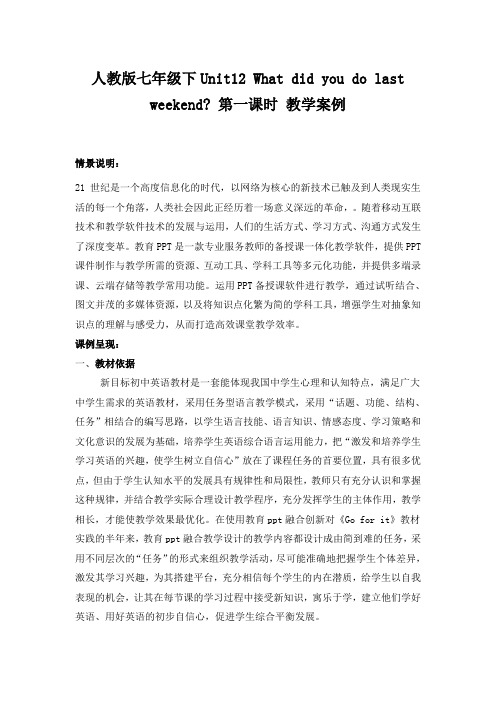
人教版七年级下Unit12 What did you do lastweekend? 第一课时教学案例情景说明:21世纪是一个高度信息化的时代,以网络为核心的新技术已触及到人类现实生活的每一个角落,人类社会因此正经历着一场意义深远的革命,。
随着移动互联技术和教学软件技术的发展与运用,人们的生活方式、学习方式、沟通方式发生了深度变革。
教育PPT是一款专业服务教师的备授课一体化教学软件,提供PPT 课件制作与教学所需的资源、互动工具、学科工具等多元化功能,并提供多端录课、云端存储等教学常用功能。
运用PPT备授课软件进行教学,通过试听结合、图文并茂的多媒体资源,以及将知识点化繁为简的学科工具,增强学生对抽象知识点的理解与感受力,从而打造高效课堂教学效率。
课例呈现:一、教材依据新目标初中英语教材是一套能体现我国中学生心理和认知特点,满足广大中学生需求的英语教材,采用任务型语言教学模式,采用“话题、功能、结构、任务”相结合的编写思路,以学生语言技能、语言知识、情感态度、学习策略和文化意识的发展为基础,培养学生英语综合语言运用能力,把“激发和培养学生学习英语的兴趣,使学生树立自信心”放在了课程任务的首要位置,具有很多优点,但由于学生认知水平的发展具有规律性和局限性,教师只有充分认识和掌握这种规律,并结合教学实际合理设计教学程序,充分发挥学生的主体作用,教学相长,才能使教学效果最优化。
在使用教育ppt融合创新对《Go for it》教材实践的半年来,教育ppt融合教学设计的教学内容都设计成由简到难的任务,采用不同层次的“任务”的形式来组织教学活动,尽可能准确地把握学生个体差异,激发其学习兴趣,为其搭建平台,充分相信每个学生的内在潜质,给学生以自我表现的机会,让其在每节课的学习过程中接受新知识,寓乐于学,建立他们学好英语、用好英语的初步自信心,促进学生综合平衡发展。
二、教材分析1.教材依据本节课选取的是新目标七年级下册Unit 12 What did you do last weekend?The first period (Section A 1a—2d)部分围绕“周末活动”展开讨论。
人教版七年级下册Unit12 第1课时 Section A(1a-1c)含答案
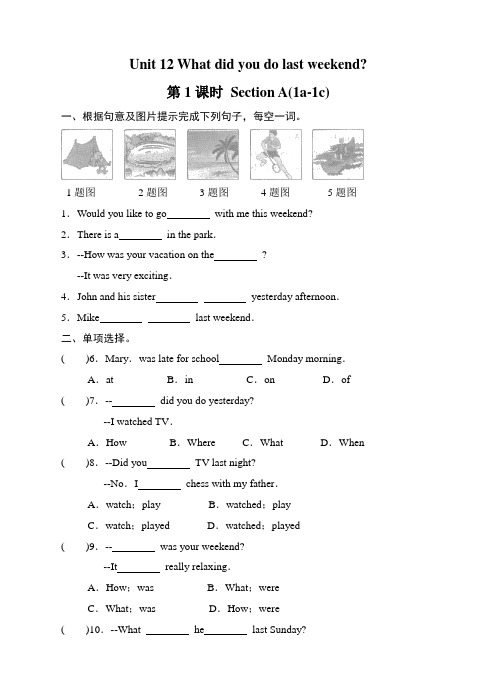
Unit 12 What did you do last weekend?第1课时Section A(1a-1c)一、根据句意及图片提示完成下列句子,每空一词。
1题图2题图3题图4题图5题图1.Would you like to go with me this weekend?2.There is a in the park.3.--How was your vacation on the ?--It was very exciting.4.John and his sister yesterday afternoon.5.Mike last weekend.二、单项选择。
( )6.Mary.was late for school Monday morning.A.at B.in C.on D.of ( )7.-- did you do yesterday?--I watched TV.A.How B.Where C.What D.When ( )8.--Did you TV last night?--No.I chess with my father.A.watch;play B.watched;playC.watch;played D.watched;played( )9.-- was your weekend?--It really relaxing.A.How;was B.What;wereC.What;was D.How;were( )10.--What he last Sunday?--He went to the zoo.A.does;do B.is;doing C.will;do D.did;do 三、按要求完成下列句子。
11.Helen washed her clothes yesterday afternoon.(对画线部分提问)Helen yesterday afternoon?12.Linda visited the museum last weekend.(改为一般疑问句)Linda the museum last weekend?13.托尼刚才在房间做作业。
七年级英语下册(人教版)Unit12第1课时(SectionA1a2c)说课稿
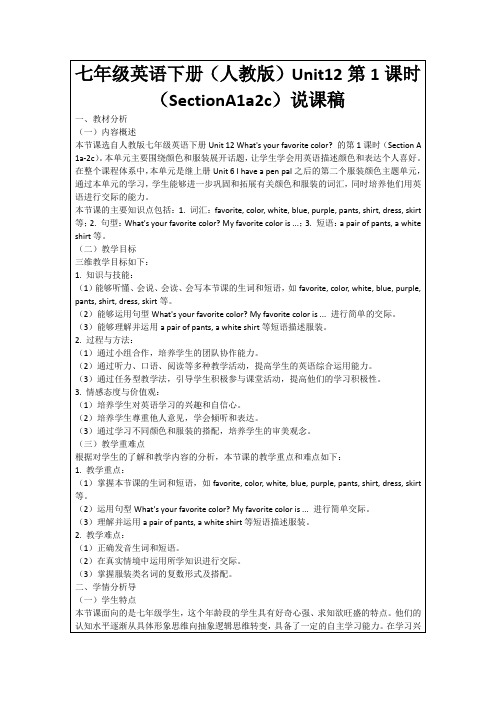
3.不断提高自身教学水平,学习新的教学理念和方法,以适应学生的需求。
(3)掌握服装类名词的复数形式及搭配。
二、学情分析导
(一)学生特点
本节课面向的是七年级学生,这个年龄段的学生具有好奇心强、求知欲旺盛的特点。他们的认知水平逐渐从具体形象思维向抽象逻辑思维转变,具备了一定的自主学习能力。在学习兴趣方面,学生对新鲜事物充满好奇,喜欢通过游戏、互动等形式学习英语。此外,学生在学习习惯上,已初步形成了合作、探究的学习方式,但仍有部分学生依赖性强,需要教师引导和督促。
(二)教学目标
三维教学目标如下:
1.知识与技能:
(1)能够听懂、会说、会读、会写本节课的生词和短语,如favorite, color, white, blue, purple, pants, shirt, dress, skirt等。
(2)能够运用句型What's your favorite color? My favorite color is ...进行简单的交际。
七年级英语下册(人教版)Unit12第1课时(SectionA1a2c)说课稿
一、教材分析
(一)内容概述
本节课选自人教版七年级英语下册Unit 12 What's your favorite color?的第1课时(Section A 1a-2c)。本单元主要围绕颜色和服装展开话题,让学生学会用英语描述颜色和表达个人喜好。在整个课程体系中,本单元是继上册Unit 6 I have a pen pal之后的第二个服装颜色主题单元,通过本单元的学习,学生能够进一步巩固和拓展有关颜色和服装的词汇,同时培养他们用英语进行交际的能力。
(三)பைடு நூலகம்动方式
人教版七年级下册 新编unit12 导学案

Unit 12 What did you do last weekend?Section A 1a — 1c (P67) 第一课时总第89课时导学案教学反思【学习目标】【学习重点】:进一步学习过去时态的用法;学会谈论过去事件。
-- What did you do last weekend?-- Well, on Saturday morning, I played badminton.【体验学习】:I、预习交流1.根据单元标题和图片等,预测新课内容;2.根据音标拼读单词并牢记;3.自学课文,勾画出重点和疑惑。
II、翻译官1. 做作业__________________2. 去海滩______________________4. go boating________________5. 打羽毛球____________________3. 去电影院 ________________ 6. camp by thelake_______________【课堂导学】:I、新课呈现Step1 Review & Lead-inAsk several students one by one: What did you do last weekend?Step2 Presentation1. Learn the phrases in 1a.2. Finish 1a, then check the answers.3. Look at the conversation, and learn the drills:-- What did you do last weekend?-- Well, on Saturday morning, I played badminton.Step3 Listening X|k | B | 1 . c|O |mListen and finish 1b. Check the answers.Step4 Pair workPractice the conversation in 1c . Then make your ownconversations.II、合作交流Group work: 尝试用一般过去时造句 + 表过去的时间状语。
人教部编版七年级下册英语教案 Unit 12 Section A (2d-3c) 导学案

Period 2Section A (2d-3c)1.I worked as a guide at the Natural History Museum.我在自然历史博物馆当导游。
(课本第68页) as在此作介词,意为“作为;当作”,其后接名词。
as还可以作连词,其用法为:(1)意为“当……时候”,引导时间状语从句;(2)意为“因为;由于”,引导原因状语从句;(3)意为“正如;如同”,引导比较状语从句。
2.How interesting!多么有趣啊!(课本第68页)英文中的感叹句可以由how和what引导。
本句是由how引导的感叹句,其结构为:How+形容词/副词(+主语+谓语)!what引导的感叹句结构为:(1)What+adj.+不可数名词/可数名词复数(+主语+谓语)!(2)What+a/an+adj.+可数名词单数(+主语+谓语)!3.They have a butterfly house with over 200 kinds of butterflies!它们(指博物馆)有一个有200多种蝴蝶的蝴蝶馆!(课本第68页)(1)with是介词,意为“拥有;带有”。
(2)over意为“超过”,相当于more than。
4.I stayed up late to watch the soccer game.我熬夜看足球赛。
(课本第68页)stay up意为“熬夜”。
1.用适当的介词填空Lu Xun is famous a writer.2.用how或what填空(1)____________ beautiful the flowers are!(2)____________ delicious food it is!3-1.用适当的介词填空I often dream of a big house a nice garden.3-2.改为同义句You may not keep it for over three weeks.You may not keep it for three weeks.4.选词填空-Don't (dress up, grow up, stay up) late, Mary. You have a singing competition tomorrow morning.-OK, Dad. I'll go to bed right now.一、汉译英1.跑开____________2.当导游____________3.告诉某人有关某事____________4.自然历史博物馆____________5.生活习惯____________6.有一个愉快的周末____________7.有点儿累____________8.熬夜到很晚____________9.观看足球比赛____________10.一门外语____________11.冲着某人叫____________二、根据汉语提示完成句子1.Can you help me feed my cat when I'm ____________(离开)?2.Look! There are so many ____________(老鼠) in the old house.3.Please be quiet. The ____________(婴儿) is sleeping.4.Don't ____________(叫喊) at her.5.What ____________(语言) does Kelly speak?三、用所给单词的适当形式填空1.Last summer my family and I ____________(swim) in the sea.2.When it ____________(rain),I stayed at home and watched TV.3.They ____________(fly) a kite on the playground happily last weekend.4.Let the boy ____________(go) home, please.5.Yesterday they ____________(go) to the beach.6.Yesterday Ben __________ his homework. He often _________ his homework after school.(do)7.I ____________(hear) a boy ____________(sing) in the room when I went downstairs.8.Tom ____________(write) a new song the day before yesterday.9.I _____(stay) up late _______(do) my homework last night and ______(get) up late this morning.10.He ____________(lose) his key and he ____________(can not) get into his home yesterday.四、阅读理解Dave was ten years old and was a very lazy boy. He had to go to school every day. He didn't like school and didn't want to do much work. His parents are doctors. They hoped that their son would become a doctor when hegrew up. But one day Dave said to his mother,“When I finish school, I want to be a dustman(垃圾工人).”“A dustman?” his mother asked. She was very surprised(惊讶的). “That's not a pleasant job. Why do you want to be a dustman?”“Because I only have to work one day a week,” Dave answered.“One day a week?” his mother asked. “What do you mean?”“Well,” Dave answered, “I know that dustmen only come to our house and work on Wednesday, because I only see them on that day.”()1.Dave did not do much work at school because ________.A.he was lazy B.he didn't like the teacherC.he was good at his lessons D.his parents would help him()2.Dave knew that ________.A.his parents wanted him to be a doctorB.his father was one of the best doctorsC.his mother worked very hardD.his teachers were very good()3.Dave wanted to be a dustman because he thought ________.A.it was the easiest workB.it was the most interesting workC.it was much better than to be a doctorD.the dustmen didn't have to work every day()4.Dave's mother thought the dustman's job was ________.A.happy B.light C.not pleasant D.not busy()5.Which of the following is RIGHT?A.Dave was a student of a very big school.B.Dave's parents worked in the same hospital.C.Dave was the only son of the family.D.Dave didn't know how dustmen did their work.参考答案Period 2【巩固练习】1.As 2.(1)How (2)What3-1.with3-2.more than 4.stay up【课时训练】一、1.run away 2.work as a guide3.tell sb. about sth.4.Natural History Museum5.living habits6.have a good weekend7.a little tired 8.stay up late9.watch a soccer game10.a second language11.shout at sb.二、1.away 2.mice 3.baby 4.shout 5.language三、1.swam 2.rained 3.flew 4.go 5.went6.did, does7.heard, singing8.wrote 9.stayed, to do, got10.lost, couldn't四、1-5.AADCD。
最新人教版七年级下英语Unit-12教案、导学案
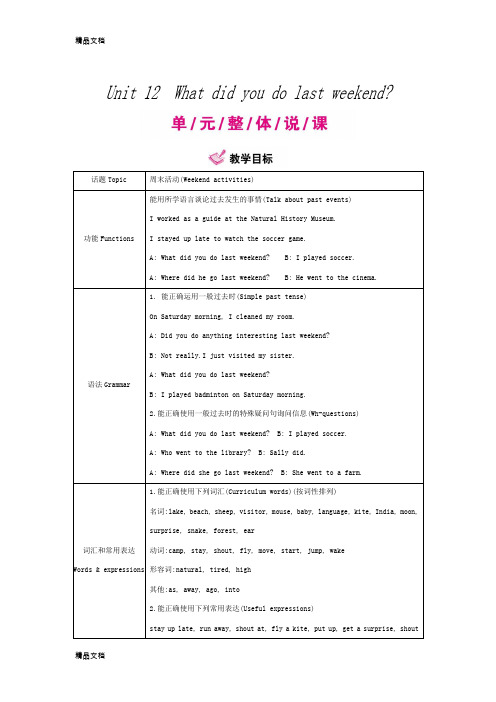
Unit 12 What did you do last weekend?1.掌握本单元出现的表示周末活动的重点短语。
2.能正确使用一般过去时,学会使用助动词did及不规则动词的过去式谈论自己上周末的活动。
3.能正确运用一般过去时写一篇自己上周末活动的短文。
4.了解国外学生的周末活动,能合理有效安排自己的周末活动。
通过听力入手,符合学生的认知,再通过说和讨论等活动使学生逐步了解一般过去时的用法,通过阅读和写作进一步巩固所学语言,使学生能正确运用一般过去时谈论上周末的活动。
教学突破:联系实际,创设语境,通过听说活动反复训练谈论自己上周末的活动;在阅读中培养学生捕捉关键信息的能力;并通过写作训练引导学生学会合理地安排自己的周末活动。
注意方法与价值观的培养:以听说带动本单元的话题,在真实的语境中感知本单元的词汇和句型,培养学生良好的沟通能力。
归纳总结一般过去时的用法及一些不规则动词的过去式,培养学生自主学习的能力。
通过循序渐进的写作训练,写出自己上周末的活动安排,培养学生自我管理的意识。
第一课时:Section A 1a-1c第二课时:Section A 2a-3c第三课时:Section B 1a-2c第四课时:Section B 3a - Self Check蛇与印度中国敬“龙”,泰国敬“象”,印度则敬“蛇”!在印度,蛇类在文化中扮演重要的角色。
印度人崇拜蛇,视蛇为“神”的化身,而眼镜蛇尤受崇敬,被称为“努拉盘布”,即“善蛇”。
在印度文明和社会发展的进程中,佛教、印度教和耆那教始终是该国的三大宗教,对现代印度的社会信仰及意识形态的形成起着十分重要的作用。
有趣的是,这些宗教的许多神像中都有着一个共同的元素——蛇。
由此可见蛇在印度人民心目中的地位和在社会文化生活中所扮演的角色。
印度有蛇庙、蛇村、蛇舞、蛇船赛,每年还专门设有全国性的蛇节来敬蛇神。
祭拜蛇神是印度传统的宗教仪式,许多印度教徒会在蛇节那天给蛇神献上鸡蛋和牛奶作为供品。
最新人教版七年级英语下册教案 unit12 第1课时 教案
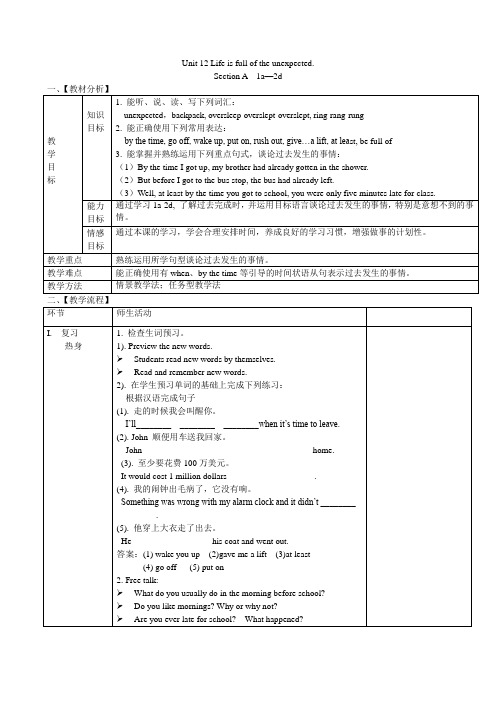
How did Kevin get to school?
2). Listen again and fill in the chart.
Alarm
clock
Time to
wake up
So
The bus
How to
get to school
8:00
After checking the answers, ask students to read the sentences carefully, and then tell the structure of past perfect tense: “had+过去分词”.
过去完成时用法:
(1)构成:由助动词had(用于各种人称和数)+过去分词”构成
2)use the bathroom but someone in it
3)catch the bus
4)had just left
5)get to school, realize …had left …
Give students some time to prepare. Then ask some students to describe the pictures.
教学重点
熟练运用所学句型谈论过去发生的事情。
教等引导的时间状语从句表示过去发生的事情。
教学方法
情景教学法;任务型教学法
二、【教学流程】
环节
师生活动
I.复习
热身
1.检查生词预习。
1). Preview the new words.
Students read new words by themselves.
人教版七下英语Unit12第1课时(SectionA 1a-2d)

Carol stayed at home, studied for the English test
Jack went to a farm, fed some cows
2a Listen and underline the words you hear. 1. _B__ I visited my (aunt/ grandma). 2. ___ I did (my homework/ sports). 3. ___ I studied for the (English/ math) test. 4. ___ I went to a (farm/ beach). 5. ___ I fed some (sheep/cows).
Well, on Saturday morning, I played badminton.
1a Match the activities with the pictures [a-f]. 1. did my homework _a_ 2. went to the cinema _d_ 3. went boating _e_ 4. camped by the lake_f_ 5. went to the beach _b_ 6. played badminton _c_
the afternoon, I went to the beach, and at night, I went to the cinema.
Bob: Cool. What about Sunday? Lucy: In the morning, I camped by the lake with my
What did you do last weekend, Lucy?
Well, on Saturday morning, I played badminton.
七下英语unit12导学案
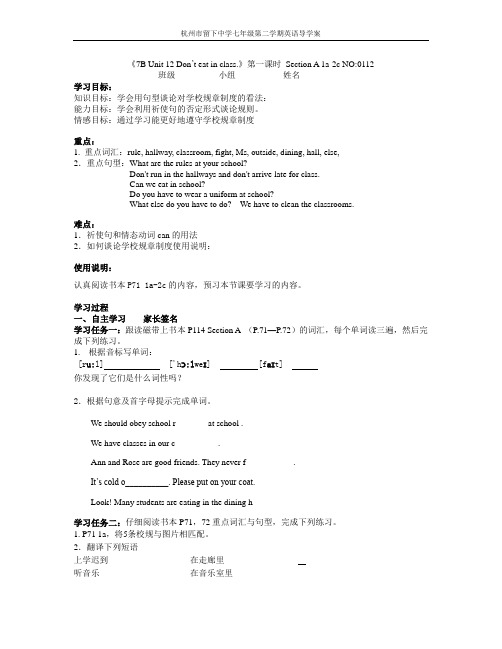
《7B Unit 12 Don’t eat in class.》第一课时Section A 1a-2c NO:0112班级_________ 小组__________ 姓名__________学习目标:知识目标:学会用句型谈论对学校规章制度的看法:能力目标:学会利用祈使句的否定形式谈论规则。
情感目标:通过学习能更好地遵守学校规章制度重点:1. 重点词汇:rule, hallway, classroom, fight, Ms, outside, dining, hall, else,2.重点句型:What are the rules at your school?Don't run in the hallways and don't arrive late for class.Can we eat in school?Do you have to wear a uniform at school?What else do you have to do? We have to clean the classrooms.难点:1.祈使句和情态动词can的用法2.如何谈论学校规章制度使用说明:使用说明:认真阅读书本P71 1a-2c的内容,预习本节课要学习的内容。
学习过程一、自主学习家长签名____________学习任务一:跟读磁带上书本P114 Section A (P.71—P.72)的词汇,每个单词读三遍,然后完成下列练习。
1.根据音标写单词:[r u:l] ['hɔ:l weɪ] [f aɪt]你发现了它们是什么词性吗?_______________2.根据句意及首字母提示完成单词。
We should obey school r_______ at school .We have classes in our c__________.Ann and Rose are good friends. They never f___________.It’s cold o__________. Please put on your coat.Look! Many students are eating in the dining h__________学习任务二:仔细阅读书本P71,72重点词汇与句型,完成下列练习。
人教版英语七年级下册Unit 12 Section A(2d-3c)导学案

Unit 12 Section A〔2d-3c〕导学案【课型】对话表演和语法课【学习目标】1. 通过2d的对话表演,领会一般过去时在具体语境中运用并熟练掌握目标语言:I worked as a guide at the Natural History Museum. I told the visitors about them and their living habits. I stayed up late to watch the soccer game.2. 通过语法表格,能更深入地理解一般过去时态的特殊疑问句的变化规律。
3. 3a(关注语言形式),3b〔关注语言意义〕和3c(关主口头交际)的逐级训练,能熟练地正确地运用过去时态的各种不同句式。
【自主学习】一、预习交流〔1〕根据Grammar Focus,归纳Section A局部语法重点。
〔2〕自学2d,勾画出重点和疑惑。
二、英汉互译(1)自然历史博物馆(2)生活习性(3)担当(4) tell about(5) kind of tired (6) stay up late【新课导入】Step l: Lead-in1. Greetings教师和学生互动交流周末怎么样,做了什么。
根据实际情况可用不同的活动短语,用得越多越好。
T: How was your weekend?S: It was great.T: What did you do?S: I fed some sheep....2. 两两对话。
Look at the pictures and talk about the weekendA: How was your weekend?B: It was great /OK /not bad/not very good...A: What did you do last weekend?B: ...【新知呈现】Step 2: Presentation1. 看图片,Lisa和Paul 正在谈论他们的周末活动。
英语:Unit 12导学案(人教版七下)
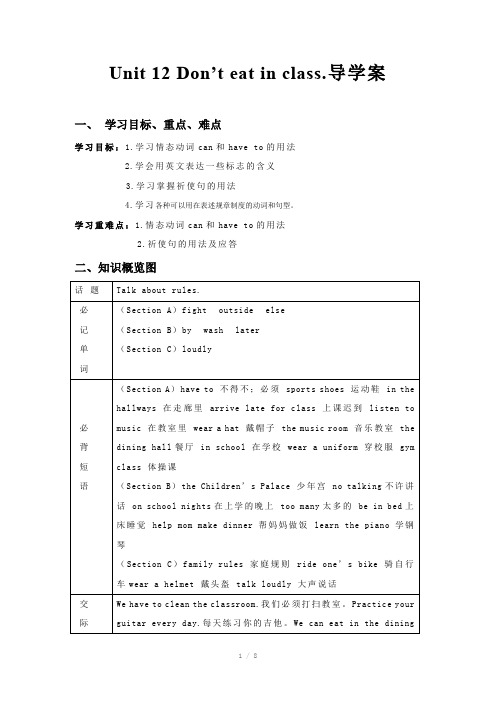
Unit 12 Don’t eat in class.导学案一、学习目标、重点、难点学习目标:1.学习情态动词can和have to的用法2.学会用英文表达一些标志的含义3.学习掌握祈使句的用法4.学习各种可以用在表述规章制度的动词和句型。
学习重难点:1.情态动词can和have to的用法2.祈使句的用法及应答二、知识概览图三、新课导引教师吃东西,问学生能否这样做,然后教师示范:Don’t eat in the classrooms.四、教材精华1. Don't arrive late for class.不要上课迟到。
(1)本句为祈使句的否定形式,表示“禁止做某事”,句型为“Don’t+动词原形+其他”。
Don’t eat in class.不要在课堂上吃东西。
(2)arrive late for…为固定短语,意为“……迟到”,相当于be late for…。
Don’t arrive late for the meeting.开会别迟到。
2. Can we listen to music, Cindy?辛迪,我们可以听音乐吗?本句是情态动词can的一般疑问句结构,can提前即可,用于询问是否可以做某事。
Can I watch TV? 我能看电视吗?【拓展】 can的一般疑问句的答语有两种,即肯定回答和否定回答。
—Can you wear hats in school?你们在学校可以戴帽子吗?—Yes, we can./No, we can’t.是的,可以戴。
/不,不能戴。
3. We can’t listen to music in the hallways, but we can listen to it outside.我们不可以在走廊里听音乐,但我们可以在外面听。
本句为情态动词can的否定句,其结构为:主语+can’t/can not +动词原形+其他。
We can’t talk in class.我们不能在课堂上说话。
人教版英语七年级下册课时达标练:[Unit 12 Section A (1a-2d)]
![人教版英语七年级下册课时达标练:[Unit 12 Section A (1a-2d)]](https://img.taocdn.com/s3/m/98659bc8ff00bed5b8f31d94.png)
Unit 12What did you do last weekend?第1课时[Unit 12 Section A (1a-2d)]Ⅰ.根据句意及汉语提示完成句子1.Mom worked all day and she is very ________(疲倦的) now.2.Hubei has a lot of beautiful ________(湖).3.Let's go to Weihai for vacation. It has a lot of beautiful ________(沙滩).4.Don't ________(待) at home. Let's go for a walk.5.2019·苏州He went ________(野营) with us and taught us how to put up a tent.Ⅱ.用括号内所给单词的适当形式填空6.Today people like eating ________ (nature) food because it is healthy.7.He ________ (not watch) TV yesterday evening.8.He put on his coat and ________ (go) out.9.Many ________ (visit) come to my city to have fun in summer.10.She usually ________ her homework at home, but she ________ her homework at school yesterday. She________ her homework now.(do)Ⅲ.根据汉语提示完成句子11.The students ______________ (去海滩) last Friday.12.They ______________ (在湖边露营) last weekend.13.Tom ______________ (喂一些羊) last night.14.I ______________(为英语考试而学习) yesterday evening.15.My brother ______________ (熬夜) to watch the soccer game last night.16.Lisa ______________ (做导游工作) at the Natural History Museum last week.17.They played basketball ______________ (在周五下午).18.My friends ______________ (打羽毛球) now.19.There are over ______________ (两百种) butterflies in the house.20.I think their ______________ (生活习惯) are quite good.Ⅳ.单项选择()21.—How ________ your weekend?—It ________ great, but I ________ tired now.A.was; was; am B.was; was; wasC.is; is; am D.is; is; was()22.—________ did you go to the mountains?—Last summer.A.Where B.What C.Who D.When()23.—________ clever the girl is!—So she is.A.How a B.HowC.What D.What a()24.My father usually ________ badminton in the afternoon, but yesterday afternoon, he ________ ping-pong.A. plays; playsB. played; playsC. plays; playedD. played; played()25.2019·广元改编—What did you do the day before yesterday?—I ________ for an English test.A.study B.studiedC.studying D.did studiedⅤ.按要求完成下列各题26.Linda and her family camped by__the__lake last weekend.(对画线部分提问)________ ________ Linda and her family ________ last weekend?27.He did__some__cleaning this morning.(对画线部分提问)________ ________ he ________ this morning?28.Her weekend was very__interesting.(对画线部分提问)________ ________ her weekend?29.They have a butterfly house. There are more than 100 kinds of butterflies in it.(合并为一句)They have a butterfly house ________ ________ 100 kinds of butterflies in it.30.I did my homework yesterday.(改为否定句)I ________ ________ my homework yesterday.Ⅵ.完形填空Last night, Victor and Annie __31__ about their last weekend. For Victor, the __32__ wasn't bad. On Saturday, he __33__ history. On Sunday, he saw a(n) __34__ talk show. “It was great!”he said. But Annie's weekend wasn't very good. She was really __35__ because she had a busy weekend. She went __36__ on Saturday morning and read a book __37__ music on Saturday afternoon. She __38__ her grandmother on Saturday evening. On Sunday, she __39__ a new song for the school music festival. It was a little__40__,so she asked her mother to help her.()31.A.talked B.told C.said D.read()32.A.weekend B.weekday C.night D.morning()33.A.thought B.looked C.bought D.studied()34.A.boring B.interesting C.open D.dangerous()35.A.happy B.relaxed C.old D.tired()36.A.store B.shopping C.school D.work()37.A.about B.to C.in D.for()38.A.had B.went C.visited D.watched()39.A.made B.did C.played D.wrote()40.A.difficult B.easy C.cheap D.fantasticⅦ. 阅读理解Last Sunday, my sister and I walked through the town we lived in. It was a sunny day. We talked about our school life happily when we walked around. Then we saw a short and thin woman walking slowly with a big box. The box was too big and heavy for her. People who passed by didn't stop to help her.My sister said, “Let's go and help that woman.” Without thinking, I said OK. Then we moved the box to her car. The woman parked her car in front of the supermarket, about 10 minutes' walk down the road. She was so happy and she thanked us a lot. We could see the happiness on her face. She told us that there were many storybooks in the box. The books were all for her students. Then she took out two storybooks from the box and gave them to us. We were happy to help but we didn't take the storybooks.We didn't spend much time. It didn't take anything out of our day, either. Those few minutes made our day better. It was the best time we had—helping a person in need.()41.What did the writer and her sister talk about on the way?A.Their hobbies. B.Their school life.C.Their town. D.The weather.()42.What did the woman look like?A.She was tall and thin.B.She was short and heavy.C.She was tall and heavy.D.She was short and thin.()43.We can know that ________.A.only the writer wanted to help thewomanB.the writer's sister didn't like helpingothersC.the writer and her sister went shopping last SundayD.the woman took out two storybooks to thank them()44.What does the underlined word “parked” mean in Chinese?A.停车B.逗留C.检查D.移动()45.What's the best title for the passage?A.A Friendly WomanB.Two StorybooksC.A Heavy BoxD.Helping People in NeedⅧ.补全对话根据下面的对话情景,在每个空白处填上一个适当的句子,使对话的意思连贯、完整。
人教7下Unit12SectionA(1a-2d)教案

评价学生的学习
8
1. T: 2d.
S: :
① ?
② ?
③a ?
: ① a . ② .
③, .
2. .
3. .
1.通过阅读,学生能通过寻找细节,达到掌握对话大意。
2.通过模仿朗读,以及表演对话,达到语言真实运用的目的。
3.有能力的学生可以在对话原文的基础上创编新的对话,并进行表演,进一步培养巩固学生英语学习兴趣,也检查学生是否掌握当堂课要求达到的教学目标。
2.听第一遍完成教材基本要求,听第二遍提高难度,要求学生用本课目标词汇及句型完成回答问题。
3.通过听音模仿,加大语言输入量以及强化语音语调学习。
1.通过听力检查学生是否能听懂目标词汇与基本句型。
2.学生是否能用目标词汇回答问题。
3.学生是否能通过听音模仿朗读课文。
4
T:. .
S: . .
?
, , I .
总结,听后设置任务提升学生语言运用能力
教学评价
1.本课时的目标设计清晰可操作,活动的设计紧扣目标要求并与目标达成一致。
2.听中的活动设计遵循语言规律,由易到难逐层递进,充分体现语言输入到语言输出的完整过程。
3.听后的活动设计体现对文本内容的深度挖掘和文本再构,体现了对学生思维品格的训练与培养。
附:教学活动设计
2.通过听力原文听音模仿,进一步巩固所学的目标语言。
1.学生是否可以听懂目标句型,并完成配对练习。
2.学生是否可以利用目标语言回答教师提问。
7
1. T: 2c. .
:
A: ?
B: .
A: ?
B: .
A: ?
B: a .
2. . .
学生利用所学目标词汇,创编新的对话,巩固拓展学生词汇及语言能力。
新版 新目标英语学科导学案七下 unit12

1.I stayed at home and __________ (do) my homework last night .
2.Mike _________(go) boating with his friends last Sunday .
3.___________ Anna _________ (study) for the math test last Saturday ?
3.say ____________ 4. run ________________
5.give ___________ 6. see ________________
7.shout _______________ 8. answer ________________
II.情景交际:
1.---____________ did you do last weekend ?
英语学科导学案·七年级英语年月日页码:177
【课题】Unit 12 What did you do last weekend ? Section A (1a-2d)第45课时
【教师二次备课】
【导学目标】
1、语言目标:描述过去所做的事情和所开展的活动。
2、能力目标:能用一般过去时叙述过去所做的事情。
【预习导航】
英语学科导学案·七年级英语页码:179
4.John and his classmates __________ (camp)by the lake
last weekend and they ___________ (have) a good time there .
5.Many ____________ (visit) come to the butterfly valley to see the _______________(butterfly) every year .
人教版新目标七年级英语下册 Unit 12 导学案

人教版新目标七年级英语下册Unit 12 导学案课题:Unit 12 A1 课型:New 课时数:2课时班级: 姓名:【教学目标】Talk about past events ,past tense of verbs【德育目标】Unite with your classmates and be ready to help others.【重点难点】How to use the simple past tense .【教学过程】二次备课预习指导:I. 默写下列单词和词组1.扎营__________2.湖________3.海滩________4.羽毛球运动__________5.羊________6.作为______7.自然的________8. 蝴蝶______9.游客_______10.疲倦的______ 11.停留_________ 12.熬夜________ _____ ________13.离开__________ 14.跑开__________ _______15.老鼠_________(复数)_________16.婴儿__________17.喊叫_______18.冲…大声叫嚷______ _______ 19.语言________II. 预习P67-P681a—2c和P57的grammar focus,写出下列短语和句子1.上周末你干什么了?__________________________________________?2.在周六上午我打羽毛球了。
_______________________________________3.去电影院___________________4.去划船___________________5.在湖边野营_____________________6.去海滩_________________7.我看望了我姑姑______________________________________8.我为数学考试而学习._________________________________________9.我喂了一些绵羊。
Unit 12 第1课时教学设计【人教版七年级英语下册】

Unit 12 What did you do last weekend?Section A (1a-2d)一、教学目标1. 能正确使用下列词汇和常用表达:camp, lake, beach, badminton, play badminton, sheep, as, natural, butterfly, visitor, tired, stay, stay up late, did my homework, went to the cinema, went boating, camped by the lake, went to the beach, played badminton2. 能用所学语言谈论过去发生的事情:(1) I worked as a guide at the Natural History Museum.(2) I stayed up late to watch the soccer game.(3) —What did you do last weekend? —On Saturday morning, I played badminton.3. 能听懂有关用一般过去时表述周末活动的对话内容。
4. 能用一般过去时谈论刚刚过去的一些常见周末活动。
5. 能通过对话训练和句型操练,让学生们巩固所学句型,并锻炼学生口语的输出能力。
6. 学习并了解国外学生的周末生活。
二、教学重点及难点重点:表示周末活动的动词短语: did my homework, went to the cinema, went boating, camped by the lake, went to the beach, played badminton难点:用一般过去时谈论刚刚过去的一些常见周末活动。
三、教学准备教师:教学课件;多媒体设备学生:课前预习四、教学过程Task 1Step 1. Warming-up1. Talk about what Ss did last weekend in groups.T: Hello, everyone! Let’s begin our class. I cleaned my room on Saturday morning. I played sports on Saturday afternoon. What did you do last weekend? Now, work it in groups.2. Choose a few volunteers to talk about what they did last weekend with the class.【设计意图】通过教师自述和小组间成员谈论上周末的事情来导入今天的话题。
(新)人教新目标七下 Unit 12 Section B(1a-1e)导学案(推荐)

七年级英语学案学习目标:1、重点单词beautiful美丽的friendly友好的cute可爱的shy害羞的smart机灵的scary吓人的live 生活2、重点词组be from来自five years old五岁kind of有点3、重点句式(1) Isn’t it beautiful? 难道它不美丽吗?(2) She’s from Africa.她来自非洲。
(3) I like Becky because she is smart and friendly.我喜欢Becky因为她很机灵和友好。
(4) She lives in Blackwood Zoo.她住在黑木动物园。
重点难点:1. 准确使用形容词描述动物特点;2. 描述动物的生存现状。
导学设计:1. Isn’t she beautiful? 她难道不美丽?【归纳】否认的一般疑问句,常用来表示反问、责备或者说话人的看法或惊异的情绪,意为“〞,其结构为“连系动词be/助动词/情态动词否认形式+主语+其他?〞Can’t you play football?你难道不会踢足球吗?Aren’t you from America? 你难道不是来自美国吗?【拓展】答复否认的一般疑问句,假设是肯定答复,用Yes开头,后面需要用肯定形式;假设是否认答复,用No开头,后接否认形式。
翻译时,Yes译为“不是〞;No译为“是的〞。
例如:---Doesn’t he have a bike? 难道他没有一辆自行车?---Yes, he does. / No, he doesn’t. 不,他有。
/ 是的,他没有。
2. She is twelve years old.她12岁了。
be+数词+years old常用来表示年龄,意为“〞。
例如:My sister is 13 years old.提问年龄用疑问短语How old。
例如:---How old are you? 你多大了?---I am twelve years old. 我是十二岁。
- 1、下载文档前请自行甄别文档内容的完整性,平台不提供额外的编辑、内容补充、找答案等附加服务。
- 2、"仅部分预览"的文档,不可在线预览部分如存在完整性等问题,可反馈申请退款(可完整预览的文档不适用该条件!)。
- 3、如文档侵犯您的权益,请联系客服反馈,我们会尽快为您处理(人工客服工作时间:9:00-18:30)。
Unit 12 What did you do last weekend?第一课时Section A (1a-2c)【教师寄语】The shortest answer is doing. 最简单的回答就是干。
【Free talk】Students talk about their favorite activity on weekend. What will you do next weekend? Students discuss with each other.【Learning tasks】1. 学生掌握本部分的单词和短语。
2. 进一步学习过去时态的用法;学会谈论过去事件。
—What did you do last weekend?— Well, on Saturday morning, I played badminton.3. 培养学生合理安排生活的能力。
【Importance and difficulties】1.本部分的重要短语。
2.表述自己在过去某一时间所做事情。
【学习过程】一、超前预习I. 预习section A 1a-2c, 写出下列单词。
1. 扎营,扎帐篷__________2. 湖,湖泊___________3. 海滩,沙滩__________4. 羽毛球运动____________5. 羊,绵羊__________II. 翻译下列短语。
1. 做作业________________2. 去看电影_______________3. 去划船________________4. 在湖边_______________5. 去海滩________________6. 打羽毛球_______________7. 看望我奶奶_________________8. 为英语测验而学习备考_________________III. 开动脑筋,说出下列句子的意思吧。
1.What did you do last weekend? _____________________________________2.I fed some sheep. ________________________________IV. 写出你的疑惑与不解:你知道sheep的复数吗?___________________________________________________________________二、课中学习I. 预习检测。
II. 自主合作互助学习解除预习中出现的疑惑不解。
知识剖析:1. --What did you do last weekend, Lucy? 露西,上周末你干什么了?--Well, on Saturday morning, I played badminton. 在星期六上午,我打羽毛球了。
(1) 本对话是一般过去时的特殊疑问句和肯定句。
(2) on Saturday morning 意为“在星期六上午”,当日期具体到某天时用介词on, 如果只有年、月就用介词in. 例如:She played soccer on the afternoon of June 1st. 她在6月1日的下午踢足球了。
(3) play badminton 意为“打羽毛球”,play 是实义动词,意为“玩”,表示进行某项活动,当“play +球类名词”时,不用任何冠词。
例如:She likes playing basketball very much. 她非常喜欢打篮球。
2. I studied for the English test. 我为英语测验而学习准备了。
(1)study 和learn 都可以表示“学,学习”,有时可以互换。
例如:When did you begin to study/ learn English? 你是什么时候开始学英语的?(2) study 侧重于学习的过程,learn 侧重于学习的结果,因此常被翻译为“学到,学会”。
例如:He studied hard and at last learned the language. 他努力学习,最终学会了这门语言。
(3) study 用于较高深或周密的“研究”;learn 侧重于学习的结果。
例如:He is studying the math problem. 他正在研究那道数学难题。
She learns English over the radio. 她通过收音机来学英语。
(4) study 还可以作名词,意为“学习;研究;书房”。
例如:The dictionary is in the study. 字典在书房里。
(5) “向某人学习”应为learn from sb. 例如:We must help each other and learn from each other. 我们必须互相帮助、互相学习。
(6) learn 除作“学习”讲外,还有“知道;听说;记住”的意思。
例如:From his teacher, I learned that he was ill that day. 从他老师那里我知道他那天病了。
III. 学习过程:1.学生完成1a, 同时小组练习对话,如:--What did you do last weekend, Lucy?--I did my homework/ went to the cinema…2. 听力技能提高。
听录音完成1b; 听前预测2a﹠2b; 听录音完成2a﹠2b.3. 综合运用能力提高:学生小组完成role-play, 运用一般过去时练习对话描述周末所做的事情。
【课堂练习】一、时态大考验(写出下列动词的过去式)1. camp____________2.work_______________3. feed_______________4. play ____________5.stay _____________6. study ______________7. tell _____________ 8. lose _______________ 9. hear_______________10. run ____________ 11.shout______________ 12. answer_____________二、选择填空1.She came here ________ a cold morning.A. inB. onC. atD. for2. _________ the evening of National Day, we played computer games.A. InB. AtC. OnD. For3. The boys played __________ volleyball after school.A. aB. anC. theD. /4. —What did you do last weekend?—I studied __________ math test.A. atB. withC. forD. of【要点归纳】1.表示过去动作的重要短语。
2.study 与learn 的区别。
【拓展练习】一、根据首字母或汉语提示完成单词。
1. —What did you do last weekend?—I played b____________.2. The children would like to go to summer c_________. They all like it.3. We went to the b__________ last Sunday.4. Lucy had to study for the English __________(考试).5. She ___________(看望) her grandma last night.二、句型转换1. Anna’s weekend was very great. (划线提问)__________ __________ Anna’s weekend?2. They played basketball after school yesterday (改为一般疑问句)_________ they _________ basketball after school yesterday?3.The children read the book two days ago. (改为一般疑问句,并做回答)_________ the children _________ the book two days ago?Yes, ____________. / No, ____________.4.I studied for the math test on Saturday evening. (划线提问)_________ _________ you _________ on Saturday evening?三、单项选择1.—What did your cousin do last week?—He ________ my father.A. visitedB. visitsC. is visitingD. visit2. He often _________ to school early, but this morning he _________ to school late.A. went; goesB. goes; wentC. goes; goesD. go; went3. _________ they _________ tennis after class yesterday?A. Did; playB. Do; playC. Do; playedD. Did; played【总结反思】_______________________________________________________________________________。
